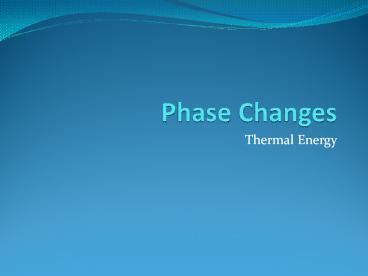Phase Changes - PowerPoint PPT Presentation
Title:
Phase Changes
Description:
Thermal Energy Phase changes A phase change is a reversible physical change when a substance changes from one state of matter to another. When ice melts to become ... – PowerPoint PPT presentation
Number of Views:829
Avg rating:3.0/5.0
Title: Phase Changes
1
Phase Changes
- Thermal Energy
2
Phase changes
- A phase change is a reversible physical change
when a substance changes from one state of matter
to another. - When ice melts to become water, it has undergone
a phase change (and a physical change).
3
The six common phase changes
4
Phase changes
- Endothermic reactions Exothermic reactions
- (absorb energy) (release energy)
- Melting Freezing
- Solid ? Liquid Liquid ? Solid
- Vaporization Condensation
- Liquid ? Gas Gas ? Liquid
- Sublimation Deposition
- Solid ? Gas Gas ? Solid
5
Spotting a phase change on a diagram
A phase change will always appear as a flat area
on a temperature/ energy graph. A flat region
shows that temperature remains constant while
energy is converting matter from one state to
another.
6
Energy required for a phase change
The heat of vaporization is the amount of energy
required for a liquid to change into a gas
(vapor). Notice how much heat is required to
change water into steam due to the length of the
flat line.
The heat of fusion is the amount of energy
required for a solid to change into a liquid.
The amounts of energy required for phase changes
to occur is different in each substance. This
graph shows a diagram for water.
7
Temperature and phase changes
- One important point to understand about a phase
change is that the temperature of the substance
changing states of matter does not change until
the phase change is complete. - So, if ice begins to melt to form water, the
temperature of the melting ice and water will
stay at the melting point until all of the ice
has changed into water. This is true due to the
large amount of energy required for matter to
undergo a phase change.






























